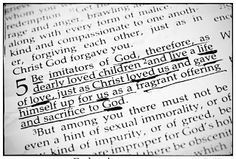When I was a kid, it seems that every time an adult asked me about "my future" the question was always stated as "what do you want to be when you grow up?" I can't say that anyone ever asked me "what do you want to do when you grow up?"
I think I know why! I've learned there is a HUGE difference between "doing" and "being." What we want to do in life is not nearly as important as what we want to be in life. "Doing" is related to earthly things such as "vocation" or "career." But, "being," on the other hand, goes much deeper because it relates to character, who we are, and how we use our life.
"Doing" is related more to tangible things such as annual income, trophies, medals, awards or material possessions. "Being" has more to do with the things in life that can't be measured by literal yardsticks, trophy cases, or bank statements.
"Being" is built on character, morals, integrity and, most importantly, upon the foundation of Jesus Christ as Lord and Savior of our lives. That means, by "being," we are trustworthy, dependable, loyal, kind, and loving people who give generously of themselves and of their possessions.
Ephesians 5:1-2, “Therefore be imitators of God as dear children. And walk in love, as Christ also has loved us and given Himself for us, an offering and a sacrifice to God for a sweet-smelling aroma.”
By "being" we live out what Jim Elliot so eloquently stated that, "He is no fool who gives what he cannot keep to gain what he cannot lose."
